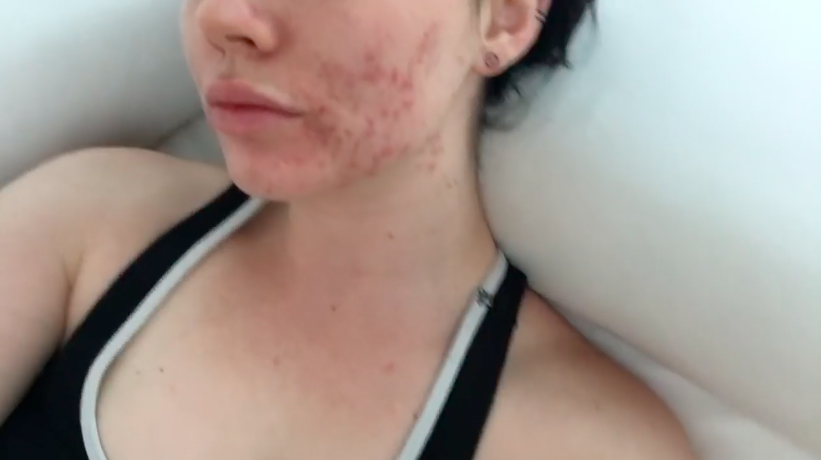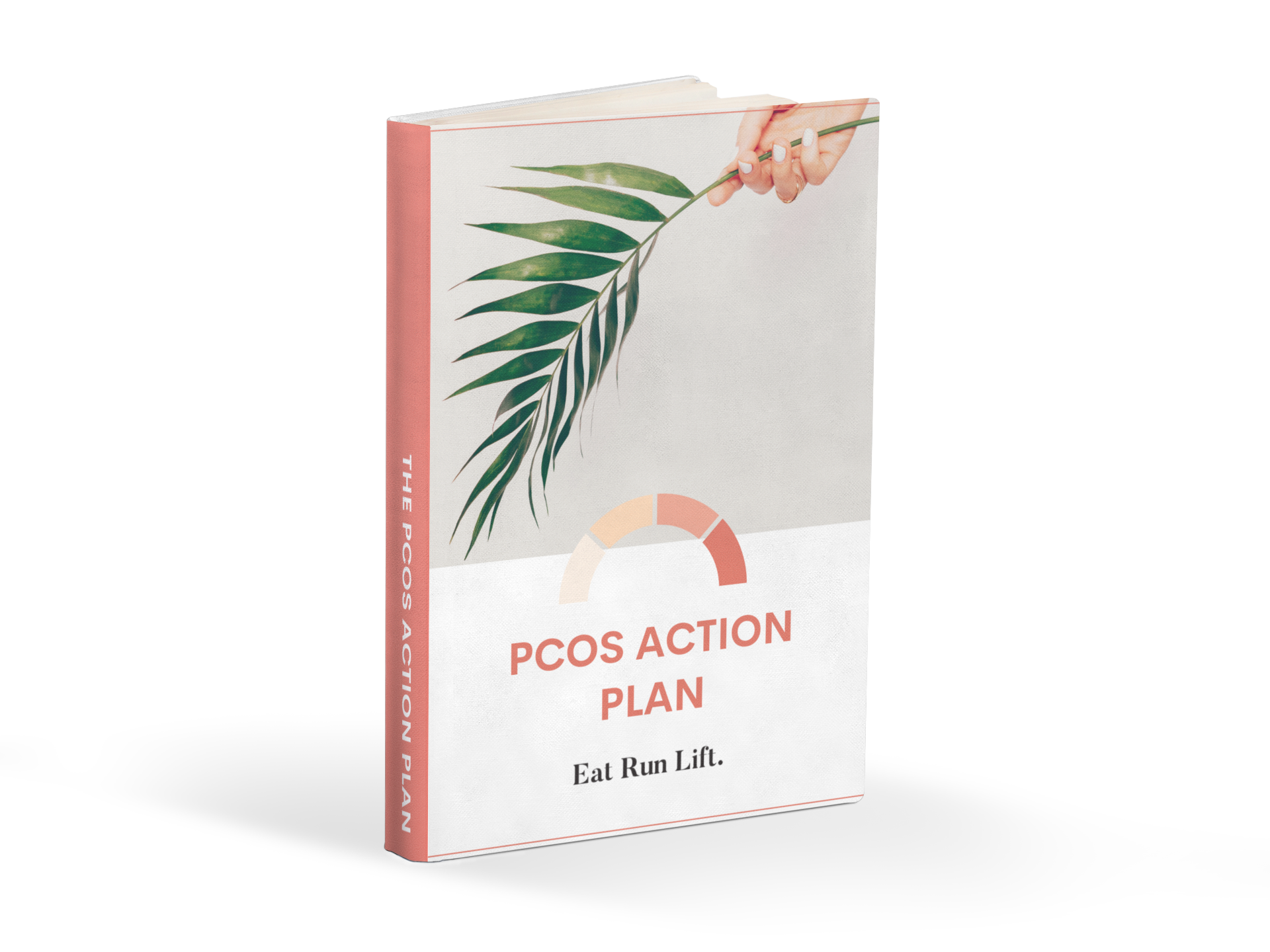What To Do After Your PCOS Diagnosis!
So you’ve seen some of the symptoms, whether that’s an irregular menstrual cycle, ovarian cysts or follicular growths, acne, weight gain, high testosterone levels, or hirstutism – to name a few. You’ve been annoyed by what your body is doing for so long, seen numerous doctors, done blood tests, scans, ultra sounds and probably a plethora of other tests too, and finally you’ve been diagnosed with PCOS. When I first found out I had it (see this video and my PCOS playlist here) I was quite upset, and I think that’s a natural part of the process when you find out your body isn’t actually ‘healthy’ or ‘normal’.
Almost exactly two years after being diagnosed (and three years after seeing symptoms) I am now at a point where I don’t see my symptoms anymore. I’ve put the work in to see improvements, and slowly, but surely, they happened. My cycle is now regular, I’ve lost the fat I gained and have now been able to build a more muscular figure, my hormones are back in range, and whilst I still get the occasional spot or two – I no longer have cystic acne covering the lower half of my face.
Screenshots from a 2016 upload (obviously talking)
Screenshots from 2018 uploads (talking again haha)
Are you struggling with PCOS symptoms?
Download my PCOS Action Plan here - it’s free!
✔ Get an easy meal idea sheet that you can draw ideas from to help reverse PCOS symptoms, lose fat, and start to feel in control of your own body again.
✔ Learn the best foods to always have on hand in your pantry to get the most out of your nutrition.
✔ Discover what kind of PCOS you have and how this impacts what approach you should use treat your symptoms.
✔ Stop feeling out of control with your body and learn how to manage your PCOS, for good!
In this blog post I’m going to share with you the steps that I believe are essential when it comes to managing your PCOS, and getting on top of it from the start. Slow changes are the best and will result in a more sustainable lifestyle in the future, so don’t think that you need to drastically change your routines all in one go. Instead, work on changing little parts of your daily activities until you reach a point where the healthier habit is the new ‘normal’. Check out my steps below to see what to do after you’ve been diagnosed:
Find A Doctor
Perhaps this is the doctor who got you diagnosed, or someone else, but it’s important to find a good GP whose beliefs align with yours. Maybe you wish to take birth control or Metformin to deal with some of the symptoms, or maybe you wish to seek out a more natural and holistic approach, either is fine, it’s up to you.
Find A Naturopath
A Naturopath (in my opinion) is an important step to take after finding out you have PCOS. A good naturopath can guide you in more than just supplementation, but can also get you to question how some of your general behaviours can aid in your wellness. For example, my naturopath in Brisbane (here) convinced me to spend more time outside with my feet in the grass, getting sunshine, I laughed it off at first because it sounded a little too crunchy granola for my liking, but the more time I spent outside in the sunshine, the better I felt. Incase you weren’t aware; there’s a strong link between PCOS and Vitamin D deficiency, with a staggering amount of 67-85% of women who have PCOS also being deficient in Vitamin D (Indian Journal of Medical Research, 2015). There are small changes you can make throughout your daily routine that can have a positive impact on your PCOS.
Find Support
Whether it’s friends or family who also have PCOS, or an online group of like-minded women. Having at least 1 person around who understands what you are going through will be beneficial. When it comes to treatment what works for them may not work for you, but at least you have someone you can talk to when you need it.
Consider How You Eat
Diet will play the largest role in the management of your PCOS symptoms. If one of the symptoms you experienced is food intolerance (gluten, dairy, etc) you may notice a significant improvement from removing this food source from your diet (even if it is for a limited period of time, eg 6-12 months). Diet changes to aid in PCOS are (again, in my opinion) the most effective over the long term, but also the slowest for change to appear.
I personally went on a ketogenic diet for 11 months to help reduce symptoms I was experiencing from my PCOS. As I have studied nutrition I was able to write my own food plan, if you do decide to take this route I HIGHLY recommend you seek out a dietician or nutritionist to write up your plan for you to ensure you’re meeting all of your intake requirements. The ketogenic diet is not one to be taken lightly. If you’re interested to learn more about it I have a video here (Thinking Keto? Everything You Need To Know) and here (8 Things You Must Know Before Starting A Ketogenic Diet), and my keto shopping list here (Blog: Keto Food List).
A ketogenic diet is an extreme route to take, and perhaps one to only try if you have exhausted other options. Usually a diet high in fibre, free of refined sugar, and with a moderate amount of protein in healthy fats will be the most beneficial to a woman with PCOS. One of the aims of diet manipulation is to decrease fasting insulin levels (Fertility and Sterility, 2004). In women with PCOS, consistently high insulin levels can result in higher free testosterone levels (The Journal of Steroid Biochemistry and Molecular Biology, 2010).
A low carbohydrate diet is usually sufficient for women with PCOS if it follows these basic guidelines:
No processed meats (fresh cuts only)
No refined sugars (no sodas, regular chocolate, biscuits, etc)
Low carbohydrate
Switching from white breads, wraps, etc, to whole meal (also called wholegrain)
Moderate amount of fats
(Optional) Dairy-free diets have been shown to help many women with PCOS
For more specific guidelines and meal ideas check out the ‘Endomorph’ recipes in the Get Lean Nutrition Guide.
Weight Loss? Or Not?
Obesity worsens the symptoms and persistence of PCOS. Women in the upper quartile of BMI are 13.7 times more likely to have metabolic issues and insulin resistance when compared to women in the lowest quartile of BMI. (Reproductive Biomedicine Online, 2006) So, the answer to whether to lose weight or not will depend on your weight (more specifically: body fat percentage) to begin with. For women who are overweight or obese, losing weight can improve PCOS symptoms.
Something to consider: even when I was losing weight on a ketogenic diet, it was only through macronutrient manipulation, not cutting calories, my daily intake was anywhere between 3000-4000 calories per day during this period.
In women who are at a healthy or low body weight who have PCOS, sticking to maintenance or even surplus calories will be the most beneficial when it comes to allowing your body to heal. Calorie deficits or trying to “diet down” just to look “shredded” when you really don’t need to be will actually increase cortisol levels in your body (Psychosomatic Medicine, 2010). This is where it’s important to have a goal that’s more than just how you look. Yes it’s nice to look ‘lean’, but unless you naturally sit at a very low body fat, this is not the healthiest thing. Consider your health before you consider your abs.
Get Your Gut Right
The more I learn about gut health, the more I am so impressed with how bacteria can control so many functions and reactions in our body. In 2016 a study on PCOS and gut microbiota used PCOS rats to compare what happened when the gut bacteria was changed (PLoS ONE, 2016). There was a control group, a group treated with lactobacillus, and a group treated with fecal microbiotia transplantation (FMT) from healthy rats. Hormonal cycles were improved in all rats in the FMT group, and in 6 out of 8 rats in the Lactobacillus groups. All of their testosterone levels were significantly decreased compared to the control rats that were not treated.
Similarly, improvements have been shown in women who are able to improve their gut microbiome, as women with PCOS tend to have less diversity in their gut bacteria (the Journal of Clinical Endocrinology & Metabolism, 2018). You can improve your gut health through supplementation (see below), increasing the amount of good bacteria in your gut via consumption of fermented foods (see this post on Fermented Foods), eating unprocessed foods, and eliminating any food intolerances.
Reduce Stress
Stress, whether it’s emotional, metabolic, oxidative, or inflammatory all impact PCOS, metabolic and reproductive functioning. Long-term stress can lead to severe health implications (Medical Hypothesis, 2018). Women who have PCOS who fail to address chronic and long-term stress may see their results going backwards: weight gain, irregular menstrual cycle, and even worsening of other symptoms such as food intolerances. According to Barry and Hardiman 2018, not reducing these kinds of stress will “exacerbate further the reproductive, metabolic, and psychological derangements of the syndrome, leading to an endless cycle of chronic illness.”
Supplements
This is something to speak to your naturopath or healthcare professional about, but supplementation may aid in a reduction of PCOS symptoms. Some supplements you may wish to enquire about:
Vitamin D (Help improve menstrual cycle)
Rhodiola and Schisandra (These adaptogenic herbs can help reduce cortisol levels and manage stress)
Myo-inositol (Improving metabolic functions)
Omega 3 (Omega 3s, in combination with a balanced diet, can help reduce testosterone levels and regulate the menstrual cycle)
Vitex (Studies have shown Vitex supplementation is efficient in reversing hormonal imbalances)
Maca Root Powder (Treatments with Maca Root for several weeks to months show reductions in cortisol, lower cholesterol and triglycerides, and increased cognitive functions. Maca Root has also been shown to regulate menstrual cycles).
Magnesium (Studies have shown women who are deficient in magnesium are 19 times more likely to display symptoms of PCOS than those who are not deficient)
Zinc (It is unclear why women with PCOS are deficient in minerals such as zinc and magnesium when intake appears to be the same as women without PCOS. Zinc is known to increase fertility, reduce hair loss, aid in skin repair, and reduce PMS symptoms. Zinc can also lower insulin levels and fight cell damage from oxidative stress).
Get Moving
It’s a well-known fact that that exercise can improve an array of health-related conditions, improve mood, and prevent against illness in the long term. Training can also improve insulin sensitivity and help alleviate some of the symptoms we experience from PCOS. Aerobic exercise can improve body composition and aid in weight loss in women who have PCOS (and the general population, of course). For a guided plan check out my 8 Week Transformation program, which can be done from home and requires no equipment.
Weight training combined with aerobic training has been shown to be far more efficient in improving insulin sensitivity and blood sugar control, whilst also reducing abdominal fat (Obesity Reviews, 2011). Check out my 6-month gym plan Get Lean to set up a long-term resistance training schedule.
I hope some of these tips will set you up on the path to success when it comes to dealing with your PCOS symptoms. They've been helpful for me, so I thought I would share. (Thanks to those who voted on my Instagram poll for this blog post, I will be uploading the Keto guide soon).






